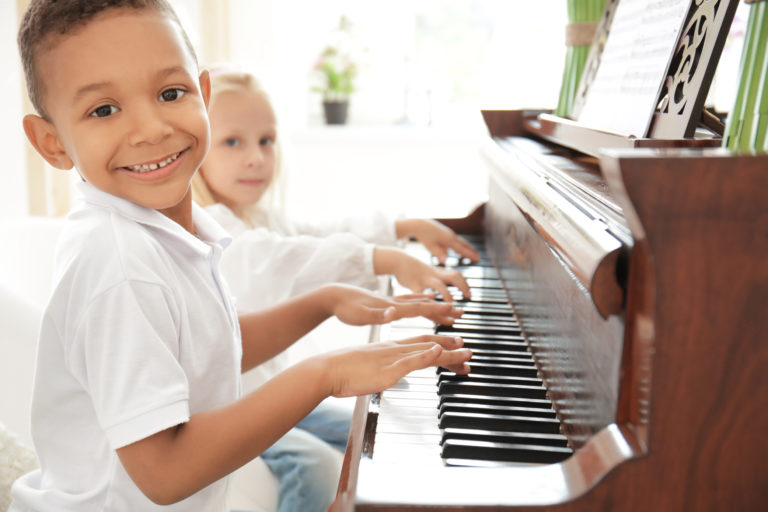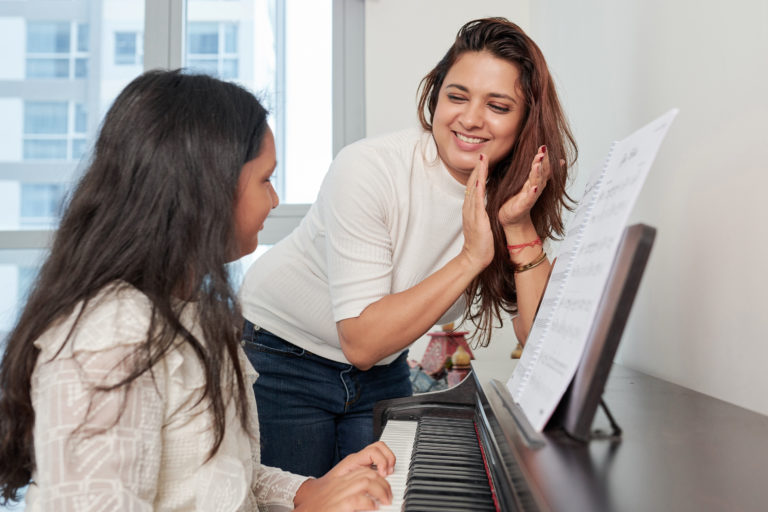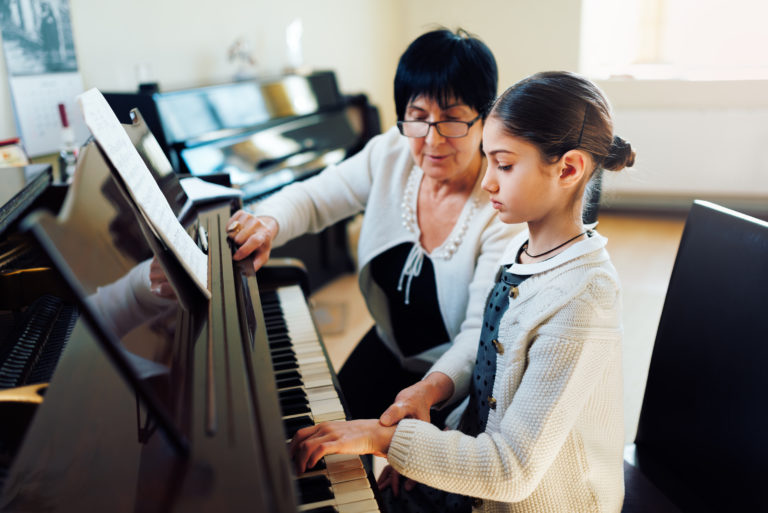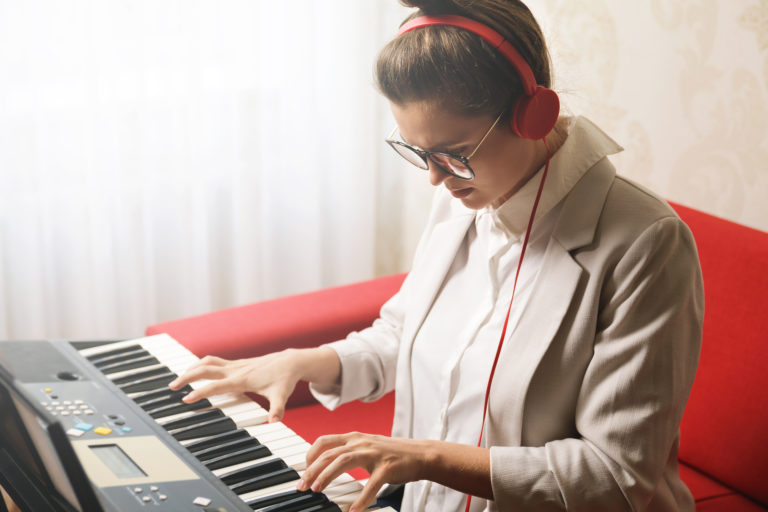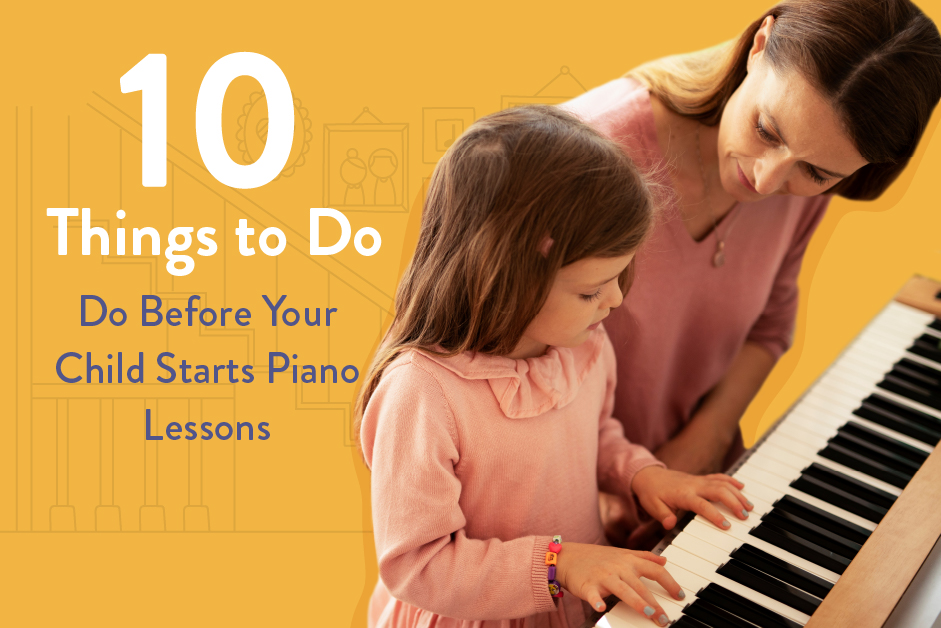Starting piano lessons for your child can feel like a big undertaking. Here are some things you can do to help your child get ready:
1. Listen to Music Together
Our children grow up surrounded by music. It’s in the movies and shows they watch and in the video games they play. Enrich your child’s music listening experience by intentionally choosing the kind of music you play in your home. Listen to your favorite popular music, but also choose some classical pieces and music from different cultures and time periods. Your public library and the internet can be great resources for sampling new music. Have a dance party with your child and some friends. Play different kinds of music and see if different genres makes you want to dance in different ways!
2. Sing Together
The first instrument you learn is your own voice. Even if you don’t think of yourself as a great singer, sing to your children and encourage them to sing along. Singing develops so many music skills that your child will use later as a piano student. Singing doesn’t need to be in a formal setting either! Sing in the car or while doing chores. Singing helps us understand how notes relate to each other and students who sing while learning to play piano learn faster and have a deeper understanding of music.
3. Watch Piano Performances
It’s super easy to find piano performances on the internet. On YouTube you can watch people of all ages playing the piano at all different skill levels. For some really impressive performances, we like the Piano Guys or Jarrod Radnich. Watching people play the piano is important for both old and new piano students! It helps us understand how to interact with the piano, different ways we can play the keys, and how to perform with musicianship in front of an audience.
4. Rhythm and Clapping Games
Games like “Pat-a-Cake” and “Pease Porridge Hot” don’t just keep the baby busy for a while. These games develop a sense of rhythm that form a foundation of music learning later in life. Visit http://funclapping.com/ for more clapping games.

5. Acquire a Piano or Keyboard
Your child will need to practice every day in order to really make progress on the piano, and so you’re going to need a piano or keyboard in your home. A well-tuned acoustic piano in good condition is ideal, but a quality electronic keyboard can also work for a beginning student. Read this article for more information on how to decide what keyboard instrument is best for your family.
6. Make Sure Your Child Is Ready
In order to be ready for piano lessons, children need to reach a certain level of both physical and mental development. Hand size, finger strength, attention span, and an interest in learning the piano are all important factors. Here’s a checklist to make sure your child is ready to begin.
7. Establish Clear Expectations
Before your child begins piano lessons, be sure to sit down and have a conversation about what you expect. Agree on a time of day to practice, every day, even if that practice is only for five minutes. Start small, but stay consistent, and then you’ll have something to build on as your child advances through their piano lessons.
As your student advances, their time spent at the piano will also gradually increase. Be prepared to adjust how much time is spent at the piano as they grow. Here’s a great article for students just beginning the piano who want some guidance on where to start.
8. Realize Your Important Role as a Parent
A young beginning piano student needs the help of an encouraging adult in order to succeed in their daily music practice. Be prepared to sit down with your child and help them practice every day. There may be times when piano feels difficult and students will need extra support. Helping your student believe in themself is crucial for their development as a musician. Read this article to find out how to be a positive practice partner.
9. Make Sure You Have the Time and Energy to Make It Work
Create a time and a place in your family’s life for learning music. If you or your child are already over-scheduled, but you feel that piano is an important thing for your child to learn, find something else you can set aside. It can be hard to find fifteen to thirty minutes a day in a busy schedule, but learning the piano is a life-long skill that can bring joy for years and years to come. Even if you feel you feel you do not have time for piano in your schedule right now, know that it is never too late to learn piano! Look for an opportunity and take it when the time comes.
10. Explore Options for Lessons
We think that Hoffman Academy is a great option for beginning piano students, but maybe there’s a fantastic private piano teacher in your very own neighborhood. For recommendations on how to choose a piano teacher, read this.
Even if your child has already started piano lessons and you haven’t done some of these things, no worries! Music lessons are an ongoing process, and piano students will benefit as you apply these principles at any time during their studies.
